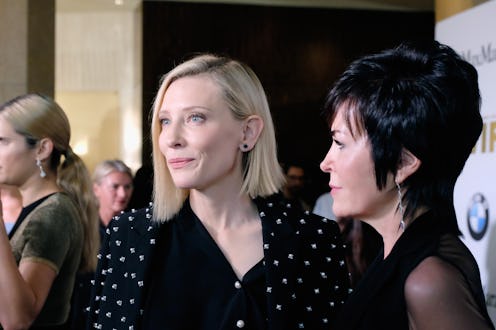Entertainment
Cate Blanchett Hates The Phrase "Female Projects"
Not only is Cate Blanchett a wonderful thespian, but she's also a nuanced, smart theorist, which is what makes her interviews such a pleasure to read. They don't tend to be the usual exercise in name-dropping and positive film PR that we've come to expect from so many Hollywood interview. Instead, they tend to be thought-out and passionate. Her Entertainment Weekly interview was no exception to this rule, especially since it gave us an insight into Cate Blanchett's own brand of feminism.
While she spent much of the interview discussing her role in Thor: Ragnarok, there was also time set aside to discuss her role in the upcoming Ocean's 8, the premise of which is that it's a woman-led spin-off from the original film series and stars Blanchett alongside Sandra Bullock, Anne Hathaway, Helena Bonham Carter, Sarah Paulson, Rihanna, Mindy Kaling, and Awkwafina. When the interviewer got enthused about what they referred to as a "powerhouse ensemble of women onscreen together," however, Blanchett was quick to point something out.
Namely, that creating films with large numbers of women isn't just a feminist issue, but an issue about entertainment as a whole. And that, by referring to such films as "female" projects, women are only hurting their own chances of being represented on screen.
Blanchett said:
"There’s this really entrenched and lazy thinking that says there’s a certain demographic who watches films a certain way and that narratives have to reveal themselves — men should be at the core and women should be an objectified part of that process. It’s really deeply uncreative. It doesn’t produce anything interesting for men or women. It’s time to stop talking about these films as 'female' projects, and just call them good and interesting projects, full stop."
She makes a lot of spot-on points in a very small amount of sentences, so let's break down this fairly dense paragraph. Firstly, she's right. While I'm a feminist, and I'm sure Blanchett is, this isn't just a feminist issue. It's not simply about equality; it's also simply about the quality of entertainment. If films are meant to mirror life, then any film that sidelines women means that it's that bit further from being any sort of meaningful reflection of the reality that most people reside in.
Her second point seems all the more powerful, though. By calling these films "female" projects, whoever is referring to them in this way is just supporting the studios' logic. They're suggesting that these films are unusual for the number of women in them. I'm going to deduce from this (though Blanchett doesn't explicitly say this) that, by her logic, if we started calling film studios out for producing movies with extremely limited numbers of well-developed female characters, and treating projects with lots of women in as the norm (rather than celebrating them for how unusual they are in terms of female characters), than we'd be getting somewhere in terms of how women are represented on screen.
So, if you're a fan of Blanchett and/or equality, make sure you skip celebrating a film as a "female" project. That way, we'll be one step closer to actually seeing a realistic number of women on screen.
